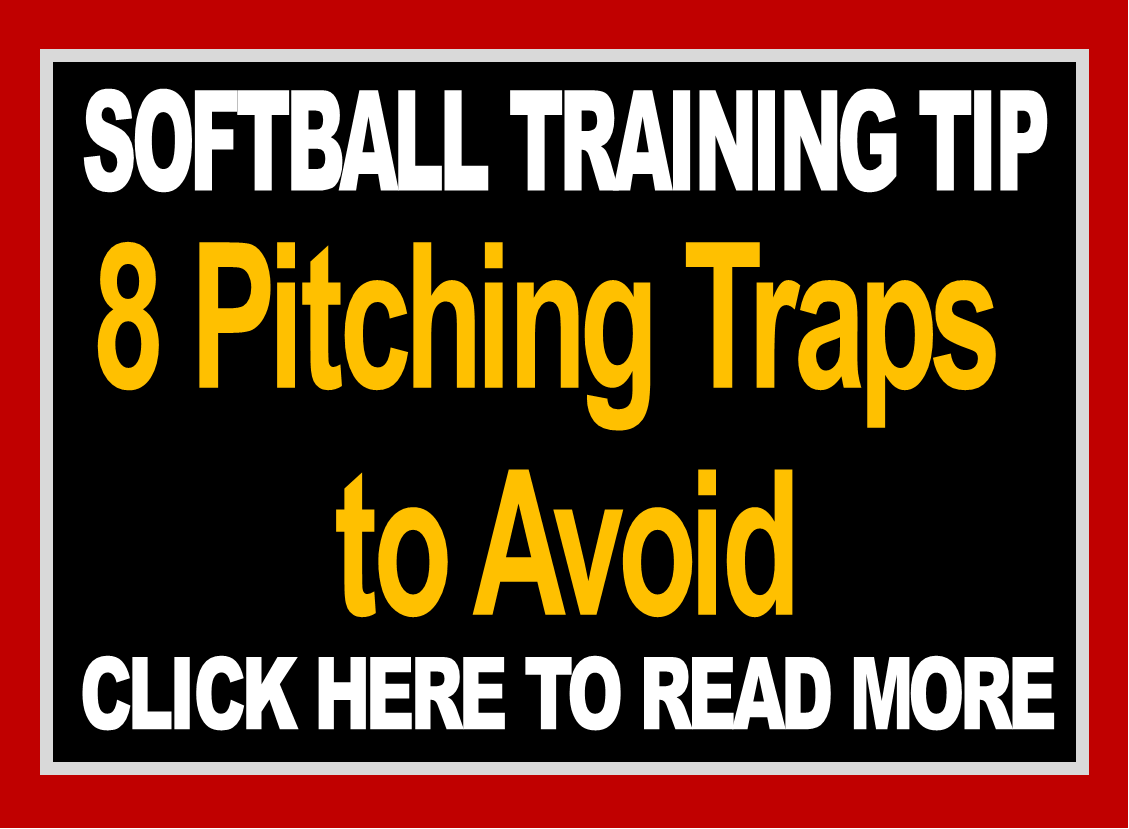
20 Mar 8 Pitching Traps to Avoid

After working for years with pitchers, I’ve come up with some things I see pitchers constantly doing – no matter how young or old they are – that either hold them down or else shoot them up to great success.
Make sure you know these 8 Pitching Traps to Avoid so you can help your pitchers stay on the right track!
Everyday I work with pitchers ranging from 8 all the way up to college age, and while these different aged pitchers vary greatly in size and skill, there are some common threads that connect all of them. You might be surprised to learn that it’s not really their fundamentals that separate the good ones from the rest. While fundamentals are certainly important, they aren’t the ONLY thing a pitcher can focus on. In fact, after giving this topic a great deal of thought, I’ve come up with some things I see pitchers constantly doing – no matter how young or old they are – that either hold them down or else shoot them up!
This is simply my list of Pitching Traps to Avoid, but it is based on years of watching, listening and working with pitchers who are all after the same thing – pitching well in games. Once you read through them all see what traps you can help your pitchers avoid, and how doing so will help them be more successful:
- Letting Someone Else Do All Your Thinking
- I put this #1 because I think a pitcher’s mind is her greatest weapon. Think about it – the batter has a $400 weapon in her hands and the pitcher has a $5 ball – the math isn’t in her favor. But, she can tip the scale if she starts using her Million $$ mind. The more she learns to think on her own the more she trusts her own thoughts and the faster she can make adjustments.
- Relying on a pitching coach to do all the thinking for you is a sure trap of doom for a pitcher. While the coach might be able to see all the adjustments that need to be made, only the pitcher can actually make them. During a game adjustments need to be made following each pitch – they can’t wait until you’re back in the dugout or the coach is out at the circle. It’s too late then. The more a pitcher can figure out on her own what she’s doing right and repeat it and what she needs to fix and then fix it – the better she’s going to be! So helping our pitchers learn to think for themselves and use their own brain strengthens them for the game!
- One way to help jump-start your pitcher’s brain is to let her determine what she’ll do in practice. It might not be what she actually ends up doing but for a pitcher to walk up to you (particularly if you don’t see her pitch during games) and ask you what she should work on is crazy. Help her figure out what things she may have struggled with in her last outing and then work with her to figure out some ways to practice improve those things.
- Basically, going brain-numb while you’re pitching and thinking it won’t hurt your pitching is nuts.
- Giving Excuses
- This was a close one for #1, but pitcher’s that win don’t give excuses. Pitchers that win make adjustments to the umpire, they make sure the wet ball is dry before pitching it, they make sure the mound is the way they like it before pitching, they make sure their catcher and pitching coach know what’s working and what’s not during the game. Successful Pitchers Make Sure, and Unsuccessful Pitchers Make Excuses.
- If you want to be successful and avoid the Excuses Trap then make a promise with yourself to eliminate this phrase from your mind, your mouth and your vocabulary:It’s not my fault!”That phrase is the single, tell-tale sign that someone else is in charge of your success instead of you! Whether you’re a player, parent or coach quit worrying about “fault” and start focusing on responsibility. Take responsibility for your results; if they’re good then repeat them and if they’re bad then fix them – forget fault and stop with the excuses.
- Let’s do a better job of helping our pitchers take responsibility for their pitching. If the umpire is bad, expect it and adjust. If the mound is bad, expect it and learn how to fix it. If the defense suddenly can’t field anything behind you encourage them and adjust. Quit complaining and simply adjust!
- I know that comes off as sounding harsh, but excuses make you sound like you weren’t good enough to handle any of the things that happened to you. Take ownership for your performance and if things happen that you don’t like then work through them to change them – with your actions and not with your excuses.
- Excuses say you weren’t good enough, results say you were!
- Letting Someone Else Do All Your Talking
- This one is more for the parents out there who tend to do the talking for their daughters. I know, it’s done out of love and concern, but it still helps to immobilize your daughter and make her very passive. Success in sports requires confidence, strength, speed, aggressiveness, work ethic – and nowhere will passiveness get you very far. So talking for your daughter, or player, while you might mean well, only hurts her in the long run. Sure, her first efforts to answer a question or speak on her own might not be what you’d say, but so what. Let her learn to have her own voice and her own thoughts and quickly, she’ll gain her own confidence as well.
- Part of our process of growing up is learning to think on our own so helping your daughter speak for herself will develop her confidence, make her feel stronger & ultimately play stronger.
- We all know that parents want what’s best for their kids but talking for your daughter by giving excuses for her performance helps give away the power to outside forces instead of em-powering your daughter. Teach your daughter to learn to adjust when things don’t go her way, to practice harder if she’s not getting enough playing time, to respect her teammates and coaches instead of bad-mouthing them, and to accept responsibility for how things turned out instead of giving excuses for why things went wrong.
- And carry your own stuff! Your parents aren’t your personal caddies. It’s your stuff, so carry it.
- Working Less But Wanting More
- This is one is really bizarre to me but so many pitchers want to be really good without working really hard. It’s as if wanting it was really all there was to it. Which of course, isn’t the case or TONS of people would be outstanding, thin, in shape, rich, great, talented, world class… But of course most people aren’t those things. Why, because of the work involved with getting there. Most of us want things but don’t really want them bad enough to work and sacrifice for them, and that’s why so few people really are outstanding, or world class. As they say, if it was easy then anyone could do it.
- It’s easier to understand this concept in regards to the physical work necessary to be a good pitcher, but the same thing applies to the mental work as well. You’d be amazed at how many pitchers completely space out while throwing pitches – both in practice as well as games! In fact, I’ve asked quite a lot of Division I pitchers how many pitches do they throw in a game when there weren’t even paying attention. Can you guess what the answer is? 15! 15 pitches where the pitcher wasn’t even paying attention but threw the pitch anyway! Want to guess how those pitches turn out?! All it takes is one of those meatballs hit over the fence and you lose, and yet with numbers like these it’s no wonder that pitchers lose games they shouldn’t.
- This whole concept of spacing out mentally while pitching starts in practice. Pitchers do it all the time since they throw too many pitches in practice so no one pitch is that important to them. Then they find themselves in a game where the pitches are way more important, yet they have the same sketchy attention span just like practice
- Helping your pitchers take more time on every pitch they throw in practice, allowing their minds to relax in-between pitches but then getting their brains (minds) back inside their head before every pitch is a great way to help insure your pitchers cut down on their mindless pitches.
- Whenever we ask pitchers to do something new or something difficult they’ll usually say, “it’s hard”! Well don’t stop because something’s hard. The fact that it’s hard means most people won’t do it, so you’re special if you do! Work hard, do what’s hard and make yourself special!
- Chasing After Complicated
- Too many pitchers think that fastballs are for babies and that the more pitches they have the better pitcher they are. Not true!
- Control NEVER is for babies! In fact, what’s the one thing that young pitchers don’t have – control! All successful pitchers must be able to throw strikes. Not the kind of strikes that rely on a poor hitter to give them by swinging and missing, but the kind of strikes you earn by throwing to the least hittable location you can – by hitting your target! The more pitches you have that you can do this with the better pitcher you are.
- Young pitchers start out throwing their fastball for strikes but soon they get mesmerized by wanting more pitches and forget they’ve got to throw pitches for strikes. As a result, they are always falling behind in the count with their fancy pitches and can’t throw their fastball for a strike anymore since they never practice it. Sound familiar?!
- We’ve got to help pitchers to stop thinking that Simple is beneath them. Just because a fastball seems simply doesn’t mean it isn’t an important weapon for most pitchers. Strikes NEVER go out of fashion for pitchers! To help your pitchers cut down on their walks focus much more on eliminating the first 2 balls in the count. Make sure you aren’t ignoring the fastball in favor of moving pitches that aren’t being thrown for strikes (and may not even be moving).
- Here’s a great rule of thumb for pitchers, as well as for coaches that call pitches: If the first pitch is a ball, the next pitch must be a fastball! The pitcher must then throw a fastball until she gets back to being ahead in the count. This means a fastball signal & fastball pitch, and NOT a fastball signal that the pitcher can decide to ignore and then throw a movement pitch in place of a fastball. Movement pitches need to be earned through control – which means strikes.
- Pitchers must practice their fastballs every day & understand they may not be as fancy or as fast as their other pitches, but they are AS IMPORTANT!
- Not Communicating with the Pitch Caller
- Just because a coach might be calling the pitches doesn’t mean that the pitchers and catchers and coaches don’t need to get together to discuss things. Meeting weekly to openly discuss things as a staff is a great way to learn what changes might need to be made as the season progresses.
- During the game the pitcher & catcher need to get with the person calling pitches after EVERY inning to discuss what’s working, what’s not working, the umpires zone, & any changes/adjustments that need to be made.
- Knowing what each pitcher thinks is working good before the game is helpful, but only for calling the first inning. After the game has started the pitcher & catcher and person calling pitches need to discuss: (a) what’s working so far in the game, (b) what the umpire’s calling and (c) what adjustments need to be made on which batters.
- This same thing happens in football. When Charlie Weiss was the Offensive Coordinator for the University of Florida, he was one of the best offensive minds in football. When Charlie drew up a game plan he determined what play is called in based on what play the quarterback was comfortable with. If the QB didn’t feel comfortable with a play, even if Weis thought it could be a great one, he wouldn’t call it. He said if the QB isn’t comfortable with a play, it’s likely not going to work. As for the game-plan, and the play-calling, Weis said he never waited until halftime to make adjustments. If things weren’t working early, he’d nix the plan and start trying to come up with some plays that worked, sometimes as early as the first quarter if it’s apparent the game-plan wasn’t going to be effective. He said sometimes it meant drawing plays up in the dirt, whatever it took to find a way to get the offense moving.
- The same thing applies to calling pitches in a softball game. If you’re calling pitches for your pitcher, make sure you know the following: (a) what pitches this pitcher has and in what order of effectiveness (b) what’s her go-to pitch (c) what pitches she uses to attack each part of the zone (d) what’s working today. When you know these things then you can use this information to call a game that uses your pitcher’s strengths to attack the hitters instead of using your favorite pitch – which might not even be something your pitcher throws (or throws well).
- Overlooking Practice for a Game
- I’m constantly amazed at how many pitchers don’t practice on their own but instead wait to practice either at team practice or lessons, or both. Well pitchers, this just won’t cut it.
- Team practice is meant to help make the “team” better and not to improve player’s individual skills. Unless your team practices every day and you have a pitching coach at each practice, and you’re allowed to practice pitching as long as you need to, then your chances of getting better through team practice alone are pretty slim.
- Pitchers need to put in their own practice time, away from their team practices. Whether you have a catcher or not shouldn’t keep you from figuring out some way to practice.
- If you think you can have poor practice habbits and still pitch well in games, then you need to prepare yourself – because your story isn’t going to end well!
- Successful pitchers practice harder than the games so they’re ready when the game comes and then the games seem easy.
- Thinking You’re Better Than Your Teammates
- Just because you pitch doesn’t mean you don’t have to follow the team rules. It doesn’t mean you don’t have to hustle, be on time, tuck your shirt in, get good grades, or treat your coaches and your teammates with respect. It just means that you pitch! Thinking and acting and being treated like you’re above your team only separates you from the team and every good pitcher knows she can’t be good without her teammates.
- Sure, pitchers have more pressure on them than most players, but that doesn’t mean they can treat people poorly. Be a leader, set a great example, help a teammate that’s struggling instead of rolling your eyes and turning your back on her. We all struggle at times and we all need good teammates – so start by being the BEST teammate on your way to becoming the Best pitcher!
- Be the teammate you want to have!
If you’re are a pitcher take these things to heart. If you’re a coach or parent, or if you know a pitcher then see how many of these things you can help your pitcher learn to avoid and as a result, your pitcher’s more likely to catch success instead of feeling like she’s always chasing it!



